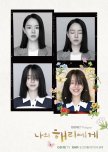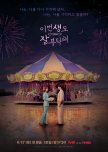
To my Haesun / Dear Hye-Sun
***Final Update (from October 30th, 2024)***The last four episodes don’t hold back on beautiful performances. Since I don’t want to spoil the story, I’ll only offer temporal hints.
Not only the actors but also the director and the cinematographer do their work masterfully. At the 30th minute of episode 10, seeing the frame where three men sit almost as if in a storefront—each in his own display frame—Quentin Tarantino’s name comes to mind. The presentation continues to be artfully executed.
From here, in episode 10, right through to the end, the story is imbued with deep emotions, and Shin Hye-Sun proves herself to be one of the best of her generation. This is especially evident in the 63rd-minute uncut scene, with two tears rolling down at the end. This is not a light drama.
For those who grasp its message, this drama will be deeply cherished. It’s not toxic. It’s melancholic, beautiful, and sad, but ultimately, it is soul-healing. Why? That’s the very philosophy of the work—Hyeri embodies the essence of a fleeting, brilliant phenomenon...
*** Update from October 18th, 2024 (before watching the 9th episode)
The eighth episode is a quiet one...
... a quiet episode...
If the eighth episode were a film, it would be an Oscar-winning one. Shin Hye-Sun's performance is outstanding, as are the others’. The director's work, the way the cinematographer captured the scenes, and how the sound engineer almost plays with the sounds — all of it is artistic and masterful.
... a quiet episode.
*** Update from October 12th, 2024:
I am adding this to my review after watching the sixth episode (and before watching the seventh). The film's title, To My Harry / Dear Hye-Ri (with many variations due to the multiple transliterations of the Korean title), is slowly beginning to reveal its possible meaning, and after the sixth episode, that meaning fills me with a bit of dread. It seems the title is the beginning of a message written to Hye-Ri. What fills me with dread is what that message will turn out to be. (So far, the title hasn’t revealed much, much like the title of Umberto Eco’s film-adapted novel, The Name of the Rose.) As for the rest of the review, nothing needs to be changed yet. The characters continue to wonderfully unravel the threads of the story.
*** End of the Update
Obviously, after watching only the first four episodes, it's difficult
to give an exhaustive review. However, the series has had a very
strong start. The story is already dynamic from the very first
episode. The screenwriter (Han Ga-Ram) avoided the mistake of
giving the series a tedious and drawn-out introduction.
The director (Jung Ji-Hyun) executed this well. The beginning of the first episode shows just enough to put the viewer in a clear position of understanding.
The story constantly holds surprises. The screenwriter doesn’t
resort to cheap solutions, making the narrative engaging and
smooth.
As expected, Shin Hye-Sun’s performance is reassuring and
brilliant. Her portrayal of the dual personality (Joo Eun-Ho / Joo
Hye-Ri) beautifully and subtly echoes her past successful roles (My Golden Life, Mr. Queen, See You in My 19th Life). Hye-Sun creates a wonderful and very enjoyable atmosphere... together with the
others like Kang Hoon, Jo Hye Joo, Lee Jin Uk, and the rest, though I won’t list them all here. They mutually and advantageously
complement each other’s roles.
We haven't yet had a behind-the-scenes look, but as is
characteristic of Shin Hye-Sun’s dramas, Dear Hyeri is marked by
beautiful visual solutions, subtle gestures, and their perfect timing. Shin Hye-Sun reveals these gestures in the most sensual moments
to the viewers – or perhaps it’s the other way around, where these delicate gestures create the enchanting moments.
Right from the start, they tell the viewers, 'This is not a love story.'
However, the viewer might still hold on to some hope, as the scenes between Hye-Ri and Ju-Yeon (Kang Hoon) are delightful (and at the same time, there’s so much uncertainty vibrating in the background – the fragility of the budding relationship is almost palpable).
Jung Hyun-O (Lee Jin-Uk) is, to say the least, an unpleasant character, and thus a difficult role. He’s not exactly likable, but he represents the darker side of events. Strangely enough, he does have some likeable moments, though the viewer might prefer to dismiss him. As uncomfortable as Jung Hyun-O may be, he is necessary; without him, the entire story would lose some of its captivating power and wouldn’t be believable.
It’s clear that Shin Hye-Sun’s role is the current that drives the
events forward, and we can’t yet see how the dual personalities will battle or assist each other. Hye-Ri’s conversation with her
psychiatrist at the end of the fourth episode is heart-wrenching.
And as she tries to communicate with her other self in an effort to
protect herself (Hye-Ri). The dual personality of Joo Eun-Ho / Joo
Hye-Ri is very different. While Eun-Ho is well-defined and
purposeful, Hye-Ri’s boundaries are blurred, and she is a vibrant,
colorful personality with surprisingly sharp insights and direct
solutions.
I’m already looking forward to the continuation... and I’m also
worried, because if the introduction is to be taken seriously [‘This is not a love story’], many heart-wrenching events are still to come.
Aja
Vond je deze recentie nuttig?

"Have you fallen in love?"
Why do children love fairy tales? Because they are stories where there’s no logic, yet they are still stories. The best stories are written by life, and they are the best because the events shouldn’t have unfolded the way they did. Yet they did, and they unfolded in a magical, fairy tale-like way.
The drama "See You in My 19th Life" is also a fairy tale—one for adults. It’s a Rom-Com, a romantic comedy. The execution is brilliant. It’s not forceful, yet it’s full of deep emotions—happy, sad, and touching ones. Perhaps that’s why it touches the soul like a balm.
I won’t go into details about the plot, so that those who haven’t seen it can fully enjoy it. The beginning is lighthearted, and the rest remains a secret for those who haven't watched it yet.
This series starts off dynamically from the very first episode, immediately captivating the viewer. I’ll tell you this: you’ll likely want to watch it twice. On the first viewing, the solutions might seem surprising, even exaggerated. However, the actors charmingly portray the dilemmas of ordinary life. What initially feels overdone turns out to be the drama’s redeeming philosophy. This is what truly drives the story, and understanding this will prompt you to watch it again. Upon a second viewing, something strange happens. It’s as if the series was shot from two different camera angles. From the second perspective, the solutions no longer seem exaggerated—they’re the best they could be. The actors convey this brilliantly on screen.
Shin Hye-Sun delivers a stellar performance. Her choice of hair color (a fox-like hue) beautifully complements the cunning character she plays—both as an actress and as a person interacting with Mun Seo-Ha (Ahn Bo-Hyun, who excellently portrays a young man tormented by memories of the past). The playfulness is not one of malice, but rather a loving attempt to get closer to him.
In almost every episode, we’re treated to beautiful, emotionally stirring visual solutions. Ban Ji-Eum (Hye-Sun) plays with her voice sensually when she believes that Seo-Ha, her young friend from a past life, can’t hear her. Ji-Eum, who remembers her past lives, affects those around her like someone blessed with an extraordinary level of empathy. And this is where the others in the story come in. The cast complements each other wonderfully. Ha Yoon-Kyung’s performance as Cho-Woon must be mentioned. She’s incredibly likable, and in several scenes, she conveys emotions from the screen with a powerful intensity. A great choice to pair with Shin Hye-Sun.
The director and the entire crew deserve praise. There are many beautiful solutions in the series, but as promised, I won’t spoil them—let them surprise you. Both in terms of content and visuals.
The child actors also shine in the series. They gave excellent performances, which was also highlighted by professional critics.
The film’s OST is romantic and wonderful.
The only negative I’d point out is the rushed ending. I was horrified when I realized I was suddenly watching the last episode. From that moment on, I was counting the minutes (only ten left, only five left...). This team could have elegantly resolved everything in an extra 30 minutes, rather than cramming it into just 15. It was too fast, with no time for the gentle unraveling that had characterized the entire series.
But who would I dock points for this? To be fair, no one.
Aja
Vond je deze recentie nuttig?


